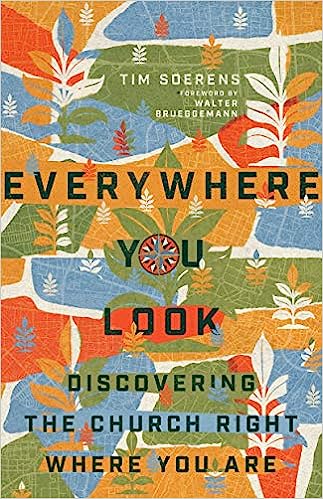Tonight we are discussing Chapter 3 “The Magic of Paying Attention” of Tim Sorens’s book, Everywhere You Look: Discovering the Church Right Where You Are.
Sacred Curiosity:
In exploring the How of the Church, Sorens calls us to “listen intently and pay attention to the Holy Spirit, who is already at work” and simply join in. p.37. Paying attention to God’s ongoing work in the world is how we go about pursuing God’s dream in our communities. p.36. We must listen before we become active. He names this active listening before being programmatically active as “sacred curiosity.” Too often, he writes, we are helpful without being curious. We seek to provide answers without first actually figuring out the questions.
An example of what can occur when we are helpful without being curious goes back to America’s occupation of Afghanistan and our missteps in trying to win hearts and minds. For example, an American military team learned that village women walked more than an hour each day to get water and had a well built in the village. The village women, however, kept secretly destroying the well (which the military kept rebuilding) because their daily walk for water was their only chance to escape the house and be together.
On the other hand, one of the best examples of sacred curiosity in the Scriptures is Paul’s visit to Athens in Acts 17. When Paul arrives in the city, he wanders around the city observing. Paul goes to the Areopagus (or Mars Hill) which is a sacred rock outcropping in Athens that was filled with religious shrines. On this hill, Paul observes a multitude of shrines including one “To an Unknown God.” Paul sees that God is active in the Athenian’s religious devotions, and joins in for the ride, to help them see the true object of their devotion.
Listen and pay attention before acting.
Self-Vulnerability:
In listening intently, paying attention, and engaging in sacred curiosity we should soon realize that we do not have all the answers. We realize that we too are in need of God’s grace, God’s healing, and God’s reconciliation and renewal. As Sorens writes, we cannot pursue God’s dream unless we too have experienced God’s dream in ourselves. “We cannot call others to belong to God and one another if we don’t rest in that reality ourselves.” p.48. Unless we recognize and experience our need for a savior (who is not ourselves), then we cannot be salt and light in the world. To see God’s Why and to participate in God’s Why, we must first leave ourselves open to continuously experience God’s Why in our lives. This vulnerable experience of God’s Why helps us better discern God’s How.
All Means All Y’all:
Sorens ends this chapter by reminding us that everyone who is in Christ is called to intentional listening and sacred curiosity, not just church leaders. As Paul tells us, the Body of Christ has many members, but all members do not have the same function. Rom. 12:3-8. In carrying out God’s Why, How, and What, each of us will have different functions because we have different gifts. But the call is for all of us to pay attention.
As part of the discussion tonight we will talk about how we can better listen intently and pay attention to the Holy Spirit. Another way to better listen to the Holy Spirit is in community. Sorens ends this chapter by telling us that listening “requires a team of listeners.” p.49. We all hear differently because we all have different past experiences and present realities. If we are to be paying attention to God’s ongoing work in the world, the more eyes we have the better off we will be.
Dinner is at 6. The menu is cheeseburgers. Discussion about 6:45. Compline at 8. Hope to see you here.
But seek ye first the Kingdom of God and His righteousness, and all these things shall be added unto you.
Matthew 6:33


Pingback: Everywhere You Look, Ch.7: Learning from Local Heros, pt.1 – Ancient Anglican